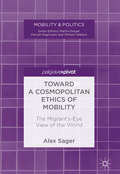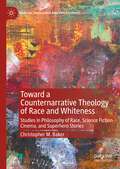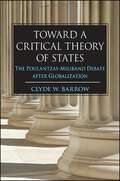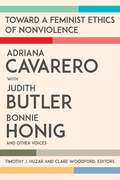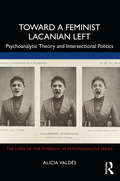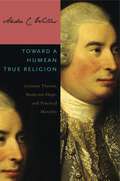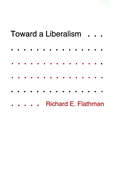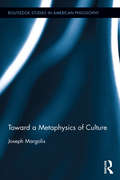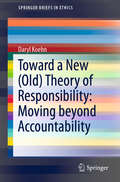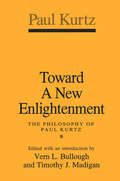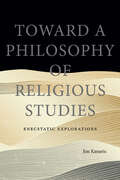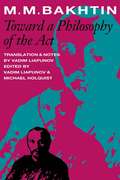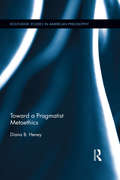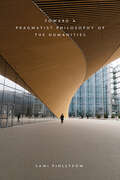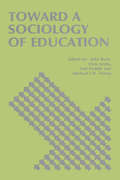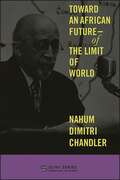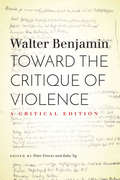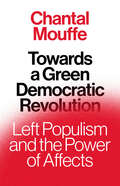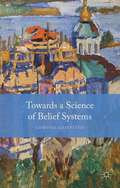- Table View
- List View
Toward a Cosmopolitan Ethics of Mobility: The Migrant's-Eye View of the World (Mobility & Politics)
by Alex SagerThis book proposes a cosmopolitan ethics that calls for analyzing how economic and political structures limit opportunities for different groups, distinguished by gender, race, and class. The author explores the implications of criticisms from the social sciences of Eurocentrism and of methodological nationalism for normative theories of mobility. These criticisms lend support to a cosmopolitan social science that rejects a principled distinction between international mobility and mobility within states and cities. This work has interdisciplinary appeal, integrating the social sciences, political philosophy, and political theory.
Toward a Counternarrative Theology of Race and Whiteness: Studies in Philosophy of Race, Science Fiction Cinema, and Superhero Stories (Radical Theologies and Philosophies)
by Christopher M. BakerThis book argues that “race” and “whiteness” are central to the construction of the modern world. Constructive Theology needs to take them seriously as primary theological problems. In doing so, Constructive Theology must fundamentally change its approach, and draw from the emerging field of Philosophy of Race. Christopher M. Baker develops a genealogy of race that understands “whiteness” as a kind secular soteriology, and develops a counternarrative theological method informed by resources from Philosophy of Race. He then deploys that method to read science fiction cinema and superhero stories as cultural, racial, and theological documents that can be critically engaged and redeployed as counternarratives to dominant racial narratives.
Toward a Critical Theory of States: The Poulantzas-Miliband Debate after Globalization (SUNY series in New Political Science)
by Clyde W. BarrowWe have recently lived through the turmoil of a global financial crisis that originated in the United States and, despite the platitudes of neo-liberal ideology, nation-states were deeply involved in managing this crisis. If "the state" is again a preeminent actor in the global economy, then state theory and the problem of the state should also return to the forefront of political theory. Toward a Critical Theory of States is an intensive analysis of the 1970s debate between state theorists Ralph Miliband and Nicos Poulantzas, including its wider impact on Marxist theories of the state in subsequent decades. Clyde W. Barrow makes unique arguments and contributions to this continuing discussion in state theory and lays the foundation for more theoretically informed empirical and historical research on the state in the age of globalization. He argues that by merely moving past the Poulantzas-Miliband debate, as some have recommended, scholars have abandoned much that is valuable in understanding the state, particularly the need to comprehend the contemporary transformation of the state form and the state apparatuses as part of the new conditions of globalization and transnational capital accumulation. Building upon themes of state restructuring found in Poulantzas and Miliband, Barrow establishes the outlines of an approach that integrates the thought of both to propose a synthetic understanding of the new imperialism.
Toward a Feminist Ethics of Nonviolence
by Judith Butler Bonnie Honig Adriana CavareroToward a Feminist Ethics of Nonviolence brings together major feminist thinkers to debate Cavarero’s call for a postural ethics of nonviolence and a sociality rooted in bodily interdependence.Toward a Feminist Ethics of Nonviolence brings together three major feminist thinkers—Adriana Cavarero, Judith Butler, and Bonnie Honig—to debate Cavarero’s call for a postural ethics of nonviolence. The book consists of three longer essays by Cavarero, Butler, and Honig, followed by shorter responses by a range of scholars that widen the dialogue, drawing on post-Marxism, Italian feminism, queer theory, and lesbian and gay politics. Together, the authors contest the boundaries of their common project for a pluralistic, heterogeneous, but urgent feminist ethics of nonviolence.
Toward a Feminist Lacanian Left: Psychoanalytic Theory and Intersectional Politics
by Alicia ValdésWhile traditional feminist readings on antagonism have pivoted around the sole axis of sex and/or gender, a broader and intersectional approach to antagonism is much needed; this book offers an innovative, feminist, and discursive reading on the Lacanian concept of sexual position as a way to problematize the concepts of political antagonism and political subjects. Can Lacanian psychoanalysis offer new grounds for feminist politics? This discursive mediation of Lacan's work presents a new theoretical framework upon which to articulate proposals for intersectional political theory. The first part of this book develops the theoretical framework, and the second part applies it to the construction of woman’s identity in European politics and economy. It concludes with notes for a feminist political and economic praxis through community currencies and municipalism. The interdisciplinary approach of this book will appeal to scholars interested in the fields of psychoanalysis, feminisms, and political philosophy as well as multidisciplinary scholars interested in discourse theory, sexuality and gender studies, cultural studies, queer theory, and continental philosophy. Students at master's and PhD level will also find this a useful feminist introduction to Lacanian psychoanalysis, discourse, and gender.
Toward a Humean True Religion: Genuine Theism, Moderate Hope, and Practical Morality
by Andre C. WillisDavid Hume is traditionally seen as a devastating critic of religion. He is widely read as an infidel, a critic of the Christian faith, and an attacker of popular forms of worship. His reputation as irreligious is well forged among his readers, and his argument against miracles sits at the heart of the narrative overview of his work that perennially indoctrinates thousands of first-year philosophy students. In Toward a Humean True Religion, Andre Willis succeeds in complicating Hume’s split approach to religion, showing that Hume was not, in fact, dogmatically against religion in all times and places. Hume occupied a “watershed moment,” Willis contends, when old ideas of religion were being replaced by the modern idea of religion as a set of epistemically true but speculative claims. Thus, Willis repositions the relative weight of Hume’s antireligious sentiment, giving significance to the role of both historical and discursive forces instead of simply relying on Hume’s personal animus as its driving force. Willis muses about what a Humean “true religion” might look like and suggests that we think of this as a third way between the classical and modern notions of religion. He argues that the cumulative achievements of Hume’s mild philosophic theism, the aim of his moral rationalism, and the conclusion of his project on the passions provide the best content for this “true religion.”
Toward a Humean True Religion: Genuine Theism, Moderate Hope, and Practical Morality
by Andre C. WillisDavid Hume is traditionally seen as a devastating critic of religion. He is widely read as an infidel, a critic of the Christian faith, and an attacker of popular forms of worship. His reputation as irreligious is well forged among his readers, and his argument against miracles sits at the heart of the narrative overview of his work that perennially indoctrinates thousands of first-year philosophy students. In Toward a Humean True Religion, Andre Willis succeeds in complicating Hume’s split approach to religion, showing that Hume was not, in fact, dogmatically against religion in all times and places. Hume occupied a “watershed moment,” Willis contends, when old ideas of religion were being replaced by the modern idea of religion as a set of epistemically true but speculative claims. Thus, Willis repositions the relative weight of Hume’s antireligious sentiment, giving significance to the role of both historical and discursive forces instead of simply relying on Hume’s personal animus as its driving force. Willis muses about what a Humean “true religion” might look like and suggests that we think of this as a third way between the classical and modern notions of religion. He argues that the cumulative achievements of Hume’s mild philosophic theism, the aim of his moral rationalism, and the conclusion of his project on the passions provide the best content for this “true religion.”
Toward a Liberalism
by Richard FlathmanIn Toward a Liberalism, Richard Flathman shows why and how political theory can contribute to the quality of moral and political practice without violating, as empiricist- and idealist-based theories tend to do, liberal commitments to individuality and plurality. Exploring the tense but inevitable relationship between liberalism and authority, he advances a theory of democratic citizenship tempered by appreciation of the ways in which citizenship is implicated with and augments authority. Flathman examines the relationship of individual rights to freedom on one hand and to authority and power on the other, rejecting the quest for a single homogenous and authoritative liberal theory.
Toward a Metaphysics of Culture (Routledge Studies in American Philosophy)
by Joseph MargolisToward a Metaphysics of Culture provides an initial, minimal, and original analysis of the concept of uniquely enlanguaged cultures of the human world and of the distinctive metaphysical features of whatever belongs to the things of that world: preeminently, persons, language, actions, artworks, products, history, practices, institutions, and norms. Emphasis is placed on the artifactual and hybrid nature of persons, naturalistic and post-Darwinian evolutionary considerations, and the bearing of the account on a range of disputed inquiries largely centered on the relationship between physical nature and human culture and between the natural and human sciences. The schema offered lays a foundation for a closer analysis of the human mind, cognition, interpretation, nomologicality, normativity, intentionality, realism, and related matters. The central thesis advances the heterodox notion, congruent with post-Darwinian studies in paleoanthropology, that the human person is a natural artifact, a functional transform of the primate members of Homo sapiens, by way of a complexly intertwined biological and encultured evolution, primarily dependent on the invention, transmission, and mastery of true language and the novel hybrid abilities that that makes possible. The emergence of persons is taken to be the obverse side of the mastery of language itself.
Toward a More Natural Science: Biology and Human Affairs
by Leon R. KassKass shows how the promise and the peril of our time are inextricably linked with the promise and the peril of modern science.<P><P> The relation between the pursuit of knowledge and the conduct of life — between science and ethics, each broadly conceived — has in recent years been greatly complicated by developments in the science of life. This book examines the ethical questions involved in prenatal screening, in vitro fertilization, artificial life forms, and medical care, and discusses the role of human beings in nature.
Toward a New (SpringerBriefs in Ethics)
by Daryl KoehnThis book offers a much needed overview of the neglected notion of responsibility. Instead of offering vague talk about “individual responsibility” or “corporate responsibility,” Daryl Koehn examines in detail four accounts of responsibility, taking care to specify what responsibility does and does not mean in each account. She argues for a return to the ancient concept of Socratic dialogical responsibility, a concept that avoids many of the problems inherent in the other accounts. After examining the Anglo-American criminal legal system’s treatment of responsibility as intentional agency, she critiques Hans Jonas’s concept of responsibility as ontological care and Hannah Arendt’s notion of communicative responsibility. She provides a careful analysis of the strengths and weaknesses of each approach to responsibility. The final chapter makes the case for Socratic dialogical responsibility. Dialogical responsibility has many strengths in its own right and avoids the major pitfalls of the other notions of responsibility examined in the book. It serves as an eminently practical way to hold ourselves responsible for our actions and speech. In addition, dialogical responsibility alone qualifies as a virtue integral to the good life.
Toward a New Enlightenment: Philosophy of Paul Kurtz
by Paul KurtzPaul Kurtz has been the dominant voice of secular humanism over the past thirty years. This compilation of his work reveals the scope of his thinking on the basic topics of our time and his many and varied contributions to the cause of free thought. It focuses on the central issues that have concerned Kurtz throughout his career: ethics, politics, education, religion, science, and pseudoscience.The chapters are linked by a common theme: the need for a new enlightenment, one committed to the use of rationality and skepticism, but also devoted to realizing the highest values of humanist culture. Many writings included here were first published in magazines and journals long unavailable. Some of the essays have never before been published. They now appear as a coherent whole for the first time. Also included is an extensive bibliography of Kurtz's writings. Toward a New Enlightenment is essential for those who know and admire Paul Kurtz's work. It will also be an important resource for students of philosophy, political science, ethics, and religion.Among the chapters are: "Humanist Ethics: Eating the Forbidden Fruit"; "Relevance of Science to Ethics"; "Democracy without Theology"; "Misuses of Civil Disobedience"; "The Limits of Tolerance"; "Skepticism about the Paranormal: Legitimate and Illegitimate"; "Militant Atheism vs. Freedom of Conscience"; "Promethean Love: Unbound"; "The Case for Euthanasia"; and "The New Inquisition in the Schools."
Toward a Phenomenology of Terrorism: Beyond Who is Killing Whom (Critical Criminological Perspectives)
by David PolizziThis book examines the socio-psychological dynamics and drivers of terrorism from a humanistic perspective. Most interpret terrorism as meaningless, asocial violence but this book argues that it's not just a case of seeing 'who is killing whom' but that defining and understanding terrorism is configured by historical context and immediate experience. The author argues that these acts of terrorist violence can be interpreted as the external expression of repressed feelings and impulses that have been tabooized by mainstream society. Upon release, these terrorists gain a new 'nomos' which generates a sense of meaning and significance for them. This book draws on psycho-analytical theories of repression, Heideggerian existentialism, Berger’s anthropological concept of culture as ‘nomos’, and Roger Griffin’s analysis of terrorist fanaticism, adding to the understanding terrorism and criminality from a new perspective and beyond the usual literature situated in political science, security/war and peace studies. This book seeks to provide: a definition of terrorism, an account of the psychological theory, an explanation of the nomic dimension of terroristic violence, an exploration of the relevance of the new approach to understanding: Salafi jihadism, Al-Qaeda, Islamic State, the Taliban, White Supremacism, the rise of the Radical Right, and reflections on this for combating terrorism. It appeals to those interested in terrorism, conflict, terrorist radicalization and motivation, international relations, politics and religious politics, and to counter-terrorism agencies.
Toward a Philosophy of Religious Studies: Enecstatic Explorations
by Jim KanarisIn this important work, Jim Kanaris provides a unique approach to the study of religion, aiming to alleviate the methodological and ideological barriers that divide philosophers, theologians, and social scientists. This is a "philosophy of religion" for a wider audience than that designation usually circumscribes, and, for that reason, Kanaris opts for the broader "philosophy of religious studies." He hybridizes insights principally from the works of Bernard Lonergan and Martin Heidegger but also those of Jacques Derrida, Charles Winquist, and Tyler Roberts, among others. Kanaris combines this with a distinctive hermeneutical approach that gives rise to what he calls "enecstatic" philosophy, one that manages the irreducible complexity of one's individuality, a singularity, in the negotiation of one's objects of concern. Toward a Philosophy of Religious Studies is unlike any other book in religious studies. It provides a unique way to surface personal involvement in the study of religion without compromising scholarly objectivity and philosophical integrity.
Toward a Philosophy of the Act
by M. M. Bakhtin Michael Holquist Vadim LiapunovRescued in 1972 from a storeroom in which rats and seeping water had severely damaged the fifty-year-old manuscript, this text is the earliest major work (1919-1921) of the great Russian philosopher M. M. Bakhtin. Toward a Philosophy of the Act contains the first occurrences of themes that occupied Bakhtin throughout his long career. The topics of authoring, responsibility, self and other, the moral significance of "outsideness," participatory thinking, the implications for the individual subject of having "no-alibi in existence," the difference between the world as experienced in actions and the world as represented in discourse--all are broached here in the heat of discovery. This is the "heart of the heart" of Bakhtin, the center of the dialogue between being and language, the world and mind, "the given" and "the created" that forms the core of Bakhtin's distinctive dialogism.A special feature of this work is Bakhtin's struggle with the philosophy of Immanuel Kant. Put very simply, this text is an attempt to go beyond Kant's formulation of the ethical imperative. mci will be important for scholars across the humanities as they grapple with the increasingly vexed relationship between aesthetics and ethics.
Toward a Philosophy of the Documentarian: A Prolegomenon
by Dan GevaThe theme of this book is the documentarian—what the documentarian is and how we can understand it as a concept. Working from the premise that the documentarian is a special—extended—sign, the book develops a model of a quadruple sign structure for-and-of the documentarian, growing out of enduring traditions in philosophy, semiotics, psychoanalysis, and documentary theory. Dan Geva investigates the intellectual premise that allows the documentarian to show itself as an extremely sophisticated, creative, and purposeful being-in-the-world—one that is both embedded in its own history and able to manifest itself throughout its entire documentary life project, as a stand-alone conceptual phase in the history of ideas.
Toward a Pragmatist Metaethics (Routledge Studies in American Philosophy)
by Diana HeneyIn our current social landscape, moral questions—about economic disparity, disadvantaging biases, and scarcity—are rightly receiving attention with a sense of urgency. This book argues that classical pragmatism offers a compelling and useful account of our engagement with moral life. The key arguments are first, that a broader reading of the pragmatist tradition than is usually attempted within the context of ethical theory is necessary; and second, that this broad reading offers resources that enable us to move forward in contemporary debates about truth and principles in moral life. The first argument is made by demonstrating that there is an arc of theoretical unity that stretches from two key founders of pragmatism—Charles Sanders Peirce and William James—through the work of John Dewey and Clarence Irving Lewis. The second argument is made by engaging with contemporary debates concerning the truth-status of the judgments and assertions made in ordinary moral discourse, as well as the role and nature of moral principles. Toward a Pragmatist Metaethics will be of interest to scholars of American philosophy, American intellectual history, and moral and political theorists, as well as anyone interested in the contours and demands of shared moral discourse.
Toward a Pragmatist Philosophy of the Humanities
by Sami PihlströmHumanist scholars often feel the need to defend the humanities. The value of humanistic research is sometimes challenged, as the cultural "reality" investigated by disciplines such as history, literary studies, and theology may seem unclearIn particular, the ontology of the humanities might be considered obscure in comparison to the ontology of the natural sciences. Toward a Pragmatist Philosophy of the Humanities proposes to develop a comprehensive philosophical account of the humanities, focusing on the ontology and epistemology of humanistic inquiry from the standpoint of pragmatism. Sami Pihlström argues that humanistic cognitive pursuits can be interpreted along the lines of a pragmatist theory of inquiry, defending pragmatic realism about the humanities. However, far from leading to any reductive naturalization of the human world, the pragmatist philosophy of the humanities defended by Pihlström takes a distinctively Kantian critical turn in emphasizing the need for transcendental argumentation in the philosophy of the humanities, insisting on the irreducibly ethical dimensions of humanistic scholarship.
Toward a Sociology of Education
by John Beck, Chris Jenks, Nell Keddie and Michael F.D. YoungBy including material from literary, philosophical, and anthropological sources, and by selecting readings which consider educational practice both within and beyond formal educational contexts, this book broadens the character of sociological inquiry in education. The editors bring together material they have found valuable when working with students of education and sociology at all levels. Many of these articles and extracts are either inaccessible or have not been reprinted. The collection should stimulate inquiry about the assumptions underlying current debates on curriculum, streaming, school organization, methods of teachin, and preconceived notions of ability.
Toward an African Future—Of the Limit of World (SUNY series, Literature... in Theory)
by Nahum Dimitri ChandlerExamines the thought of W. E. B. Du Bois, with attention to its potential for reorienting present-day critical theory and political philosophy.Widely known for his probing analysis of W. E. B. Du Bois's early work, in this book Nahum Dimitri Chandler references writing from across the whole of Du Bois's long career, while bringing sharp focus on two later texts issued in the immediate aftermath of World War II-Color and Democracy: Colonies and Peace and The World and Africa: An Inquiry into the Part which Africa Has Played in World History. In these texts, "the problem of the color line," which Du Bois had already characterized as the problem not only of the twentieth century, but of the modern epoch as a whole, is further figured as a global problem, as a horizon linking the contemporary conjuncture of the history of modern systems of enslavement with the ongoing impact of modern colonialism and imperialism on the world's possible futures. On this line of thought, Chandler proposes that the name of "Africa" is a theoretical metaphor that enables a hyperbolic re-narrativization of modern historicity. Du Bois thus emerges as an exemplary thinker of history and hope for the world beyond the limit of the present.
Toward an Anthropology of Screens: Showing and Hiding, Exposing and Protecting
by Mauro Carbone Graziano LinguaThis book shows that screens don’t just distribute the visible and the invisible, but have always mediated our body's relationships with the physical and anthropological-cultural environment. By combining a series of historical-genealogical reconstructions going back to prehistoric times with the analysis of present and near-future technologies, the authors show that screens have always incorporated not only the hiding/showing functions but also the protecting/exposing ones, as the Covid-19 pandemic retaught us. The intertwining of these functions allows the authors to criticize the mainstream ideas of images as inseparable from screens, of words as opposed to images, and of what they call “Transparency 2.0” ideology, which currently dominates our socio-political life. Moreover, they show how wearable technologies don’t approximate us to a presumed disappearance of screens but seem to draw a circular pathway back to using our bodies as screens. This raises new relational, ethical, and political questions, which this book helps to illuminate.
Toward an Architecture of Enjoyment
by Henri LefebvreToward an Architecture of Enjoyment is the first publication in any language of the only book devoted to architecture by Henri Lefebvre. Written in 1973 but only recently discovered in a private archive, this work extends Lefebvre&’s influential theory of urban space to the question of architecture. Taking the practices and perspective of habitation as his starting place, Lefebvre redefines architecture as a mode of imagination rather than a specialized process or a collection of monuments. He calls for an architecture of jouissance—of pleasure or enjoyment—centered on the body and its rhythms and based on the possibilities of the senses.Examining architectural examples from the Renaissance to the postwar period, Lefebvre investigates the bodily pleasures of moving in and around buildings and monuments, urban spaces, and gardens and landscapes. He argues that areas dedicated to enjoyment, sensuality, and desire are important sites for a society passing beyond industrial modernization. Lefebvre&’s theories on space and urbanization fundamentally reshaped the way we understand cities. Toward an Architecture of Enjoyment promises a similar impact on how we think about, and live within, architecture.
Toward the Critique of Violence: A Critical Edition
by Walter BenjaminMarking the centenary of Walter Benjamin's immensely influential essay, "Toward the Critique of Violence," this critical edition presents readers with an altogether new, fully annotated translation of a work that is widely recognized as a classic of modern political theory. The volume includes twenty-one notes and fragments by Benjamin along with passages from all of the contemporaneous texts to which his essay refers. Readers thus encounter for the first time in English provocative arguments about law and violence advanced by Hermann Cohen, Kurt Hiller, Erich Unger, and Emil Lederer. A new translation of selections from Georges Sorel's Reflections on Violence further illuminates Benjamin's critical program. The volume also includes, for the first time in any language, a bibliography Benjamin drafted for the expansion of the essay and the development of a corresponding philosophy of law. An extensive introduction and afterword provide additional context. With its challenging argument concerning violence, law, and justice—which addresses such topical matters as police violence, the death penalty, and the ambiguous force of religion—Benjamin's work is as important today as it was upon its publication in Weimar Germany a century ago.
Towards A Green Democratic Revolution: Left Populism and the Power of Affects
by Chantal MouffeHow to rebuilt left populism around the demands for the Green Democratic RevolutionIn recent years, the promises of the populist moment have faltered, as seen in the defeats of Jeremy Corbyn, Bernie Sanders, Jean-Luc Melenchon. In addition, the pandemic has brought about a strong need for protection, creating a favorable terrain for authoritarian forms of politics. This new situation represents a challenge for the left, whose rationalism and modernist idea of progress is rightly suspicious of such demands. How, therefore, can the left deal with the economic, social and ecological crisis that the pandemic has brought to the fore?Chantal Mouffe argues that the left should not underestimate the importance of affects when developing a strategy for political change. In fact, after years of &‘post-politics&’, we are witnessing a &‘return of the political&’. And in response Mouffe proposes the creation of a broad coalition of movements under the banner of a 'Green Democratic Revolution'. This entails the protection of society and its material conditions in a way that empowers people instead of making them retreat in a defensive nationalism or in a passive acceptance of technological solutions. It is protection for the many, not the few, providing social justice and fostering solidarity.Towards A Green Democratic Revolution is a bold rallying cry for political organisation in the post-pandemic era.
Towards A Science Of Belief Systems
by Edmund GriffithsPeople believe in a great many things: the New Age and the new atheism, astrology and the Juche Idea, the marginal utility theory and a God in three persons. Yet most of us know almost nothing about why other people believe the things they do or indeed about how it feels to believe them. This book presents an objective method for understanding and comparing belief systems, irrespective of their subject matter and of whether or not the investigator happens to agree with them. The method, descriptive logic, is illustrated through analyses of various phenomena, including Zoroastrianism, Dawkinsism, Fabianism, 9/11 Truth, 'alternative' Egyptology, Gnosticism, flying saucer sightings, and the hymns of Charles Wesley. Special attention is given to beliefs that are not supposed to be wholly believed, and to how descriptive logic relates to the materialist conception of history. The book also outlines a new theory of superstition. "
